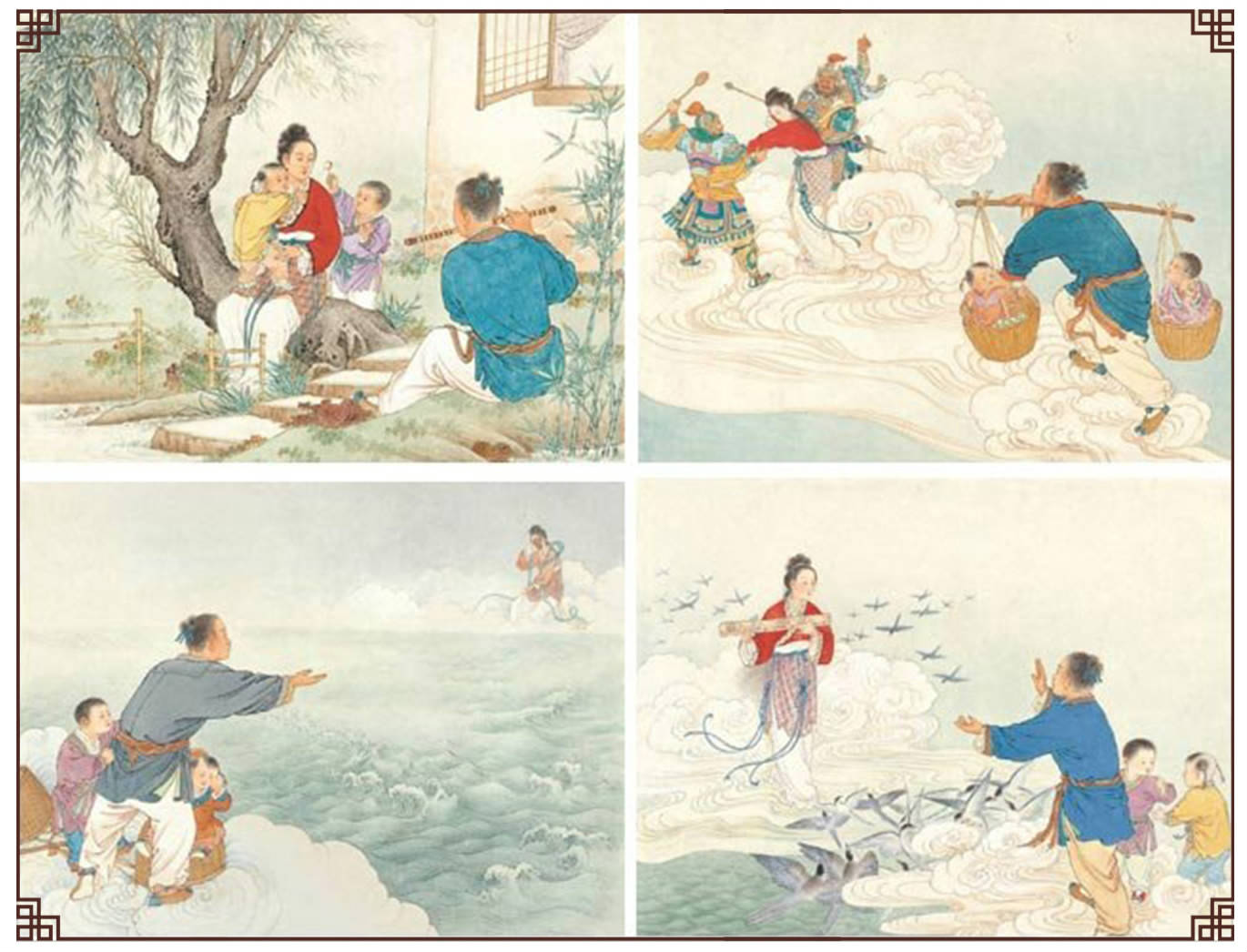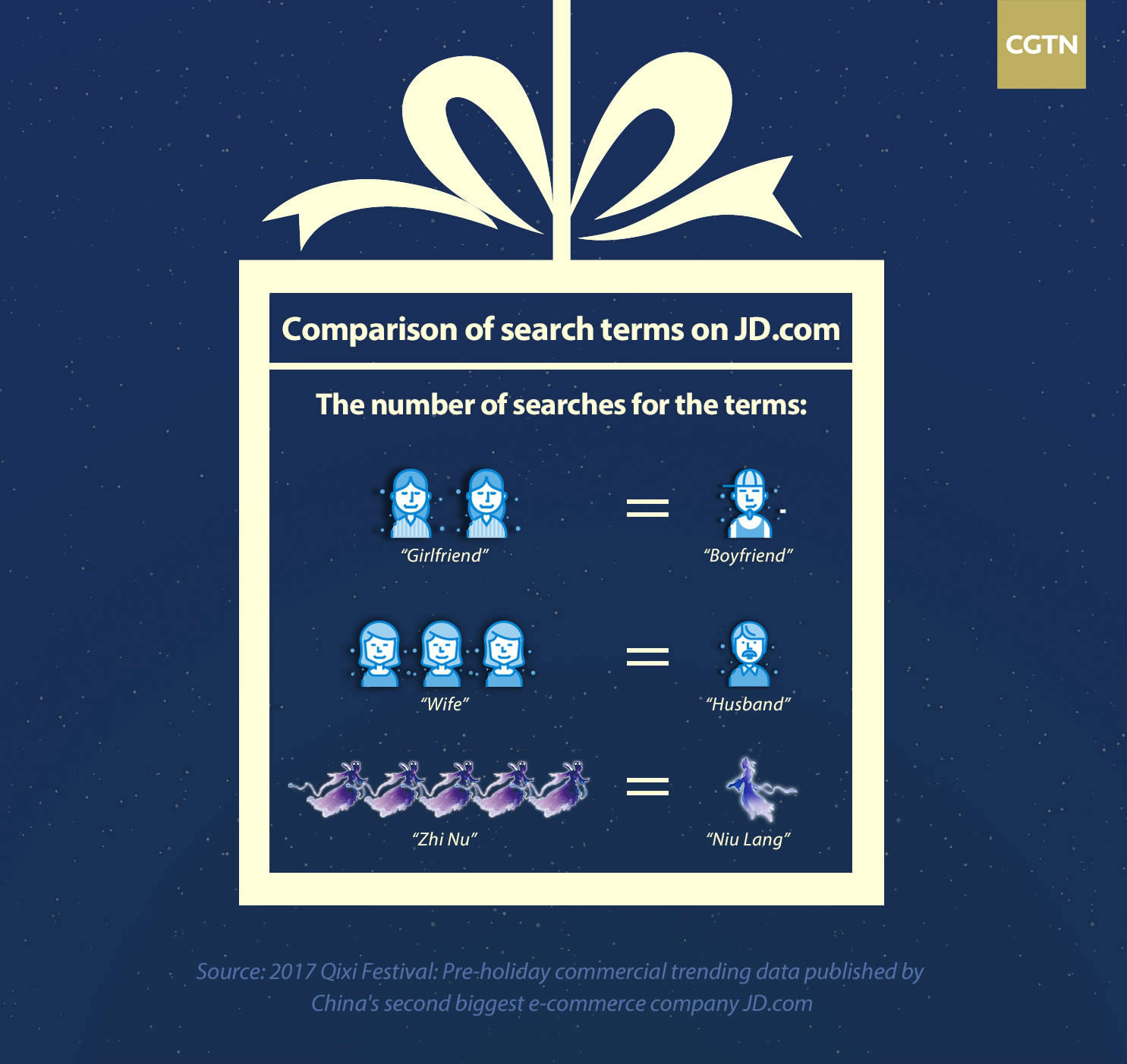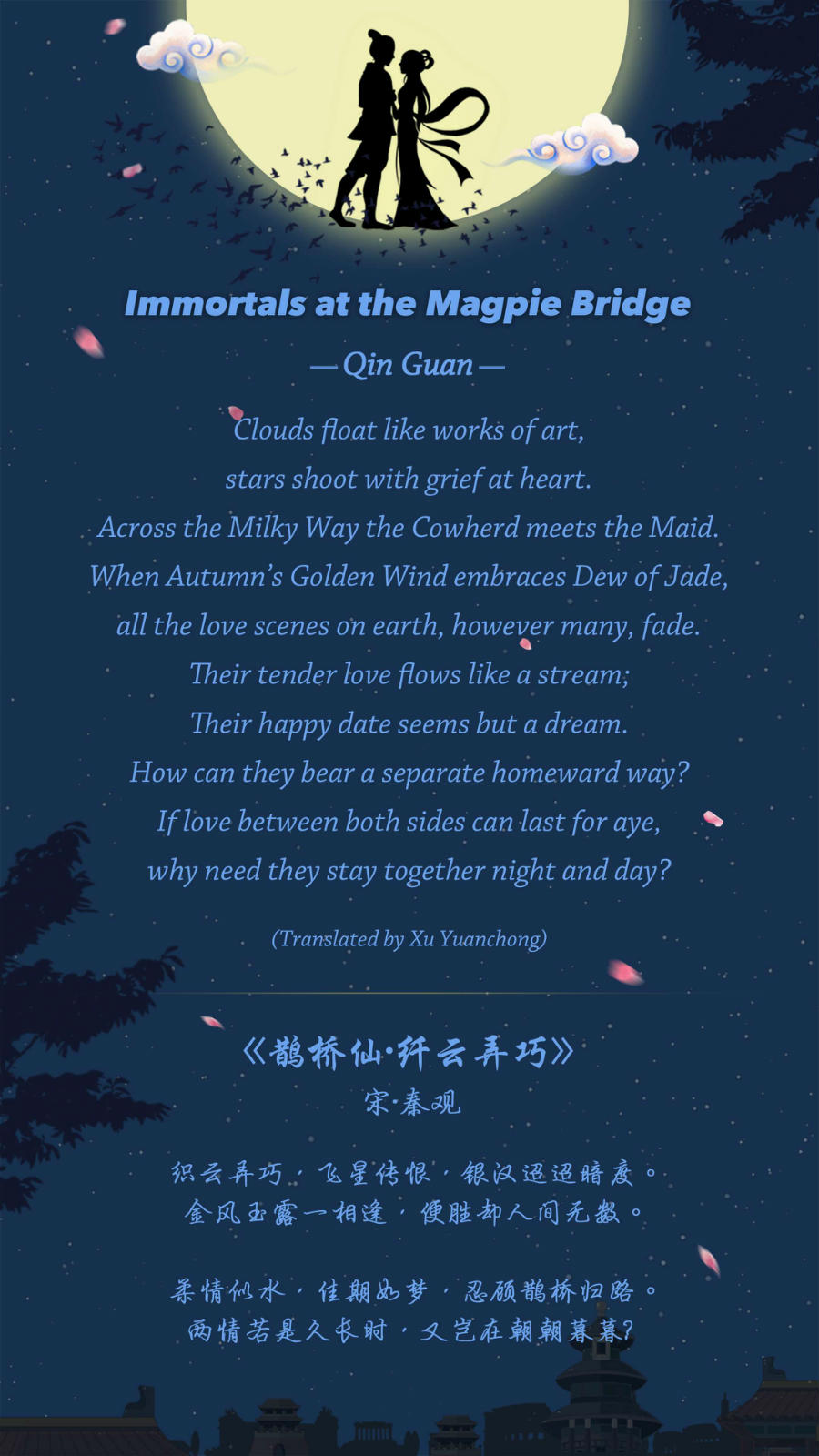


CGTN photo
The Qixi Festival celebrates the annual rendezvous between a fairy and a human whose love was forbidden in Chinese mythology. Also known as the Double Seventh Festival, it encapsulates the meanings of great romance and steadfast love – notions that are equivalent to Valentine's Day in Western countries.
Falling on the seventh day of the seventh month of the Chinese lunar calendar, Qixi is the only Chinese festival devoted to love. The legend of the two separated Chinese lovers has been celebrated since the Han Dynasty (202 BC – 220 AD).

The Qixi Festival celebrates the annual rendezvous between a fairy and a human whose love was forbidden in Chinese mythology. /CGTN Photo
In 2016, the State Council added Qixi to China’s Intangible Cultural Heritage list along with the Spring Festival and Dragon Boat Festival.
A fairy tale: The cowherd and weaver maiden
The folklore story, which dates back to over 2,000 years, speaks of the romantic but tragic love between a cowherd on Earth, Niu Lang, and a weaver maiden Zhi Nu, who is the seventh daughter of the Jade Emperor and Mother Queen of the Heaven. The two fell in love at first sight and soon got married against the rules of the Heaven.
Zhi Nu was finally called to ascend back to the sky, but her husband followed after.

Chinese traditional paintings showing the story of The Cowherd and Weaver Maiden /Photo via Global Times
The infuriated Mother Queen slashed her hairpin, creating a billowy river up in the sky, known today as the Milky Way, to separate the two.
But all was not lost. Years later, a flock of magpies moved by their love and devotion formed a celestial bridge across the Milky Way, and the couple was permitted to see each other from across the river once a year – the seventh day of the seventh month. Instead of physical attraction and desire, faith and emotional connection are emphasized in the story – a common theme in many other Chinese tales about love.
Traditional customs based on celestial twist
In old times, stargazing on the night of Qixi used to be a traditional custom since the two star-crossed lovers were seen as representing the alignment of the stars Altair and Vega, which shine on opposite sides of the Milky Way.
Traditionally, Qixi was not only a special day for lovers, but also girls, as it was named the "Begging for Skills Festival" or "Daughters' Festival."
During the festival, girls attempted to display their domestic skills. In rural regions, they would prepare offerings of fruits and pray to Zhi Nu – a heavenly being deft at weaving – in the hope of improving their needlework abilities and finding a satisfactory husband.
Couples also celebrated their loyal love on this day by heading to temples hoping to get pregnant or begin a relationship with happiness and prosperity.

Girls pray to the Weaver Maiden Zhi Nu at a temple on the night of the Qixi Festival in China. /Photo via thnet.gov.cn
How is Qixi Festival celebrated now?
Nowadays, many modern Chinese, particularly youngsters, view Qixi as the Chinese equivalent of Valentine’s Day and interpret it as more of a commercial occasion than an emotional one.
The festival, which now goes hand in hand with special offers, is heavily marketed towards young, hip and trendy urban dwellers, regardless of their relationship status, with the aim of convincing couples to prove their love by buying gifts and singles to profess their love by doing the same. Those who are yet to find their significant others can benefit from matchmaking events as finding a partner is still an important tradition to mark the day.

Posters of ads announcing sales during Qixi Festival / Photo via 5tu.cn
Annual shopping extravaganza
From overly-priced flowers and unneeded plush toys to redundant ads about romantic escapades and candlelight dinners, Qixi now speaks to Chinese urbanites’ wallets rather than hearts. The legendary pair's annual reunion has become a shopping holiday for lovers, with women receiving the lion’s share of gifts purchased.
Last year, China's biggest search engine Baidu reported that during Qixi festival the highest number of searches contributed to the topic: “What gift would you buy for [your] girlfriend on Qixi?”

Qixi is a gift holiday for women in particular based on the comparison of search terms on JD.com. /CGTN Graphics
‘Festival of love’ a global phenomenon
Valentine’s Day was originally dedicated to the memory of St. Valentine of Rome, whose name was connected with courtly love. However, the scope of the occasion widened to express gratitude and love to not only partners, but also parents, friends, teachers, or other acquaintances. While customs associated with the "festival of love" vary across different regions, the same hope is cherished by all.
The Qixi Festival is part of China's culture, inspiring the Tanabata Festival (Star Festival) in Japan and Chilseok Festival in South Korea which are both based on the very similar mythology and background of the ancient Chinese folktale.
Today, fewer people will gaze at the night sky on Qixi to look at the two brightly shining stars and a shrinking number of young women will take part in worshipping Zhi Nu and wishing for dexterity in embroidery and more wisdom. These ancient traditions and customs have disappeared, but the story of the loyal lovers still lives on, being passed down from generation to another and told with passion and pain time and again.

Qin Guan's poem “Immortals at the Magpie Bridge” from the Song Dynasty. /CGTN Graphics

 Award-winning photos show poverty reduction achievements in NE China's Jilin province
Award-winning photos show poverty reduction achievements in NE China's Jilin province People dance to greet advent of New Year in Ameiqituo Town, Guizhou
People dance to greet advent of New Year in Ameiqituo Town, Guizhou Fire brigade in Shanghai holds group wedding
Fire brigade in Shanghai holds group wedding Tourists enjoy ice sculptures in Datan Town, north China
Tourists enjoy ice sculptures in Datan Town, north China Sunset scenery of Dayan Pagoda in Xi'an
Sunset scenery of Dayan Pagoda in Xi'an Tourists have fun at scenic spot in Nanlong Town, NW China
Tourists have fun at scenic spot in Nanlong Town, NW China Harbin attracts tourists by making best use of ice in winter
Harbin attracts tourists by making best use of ice in winter In pics: FIS Alpine Ski Women's World Cup Slalom
In pics: FIS Alpine Ski Women's World Cup Slalom Black-necked cranes rest at reservoir in Lhunzhub County, Lhasa
Black-necked cranes rest at reservoir in Lhunzhub County, Lhasa China's FAST telescope will be available to foreign scientists in April
China's FAST telescope will be available to foreign scientists in April